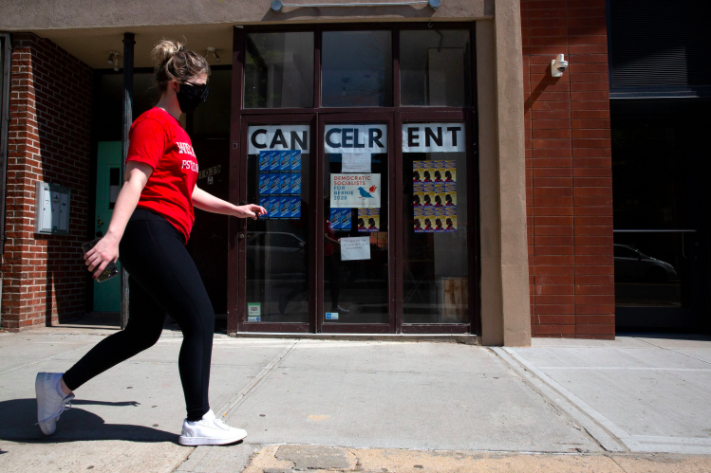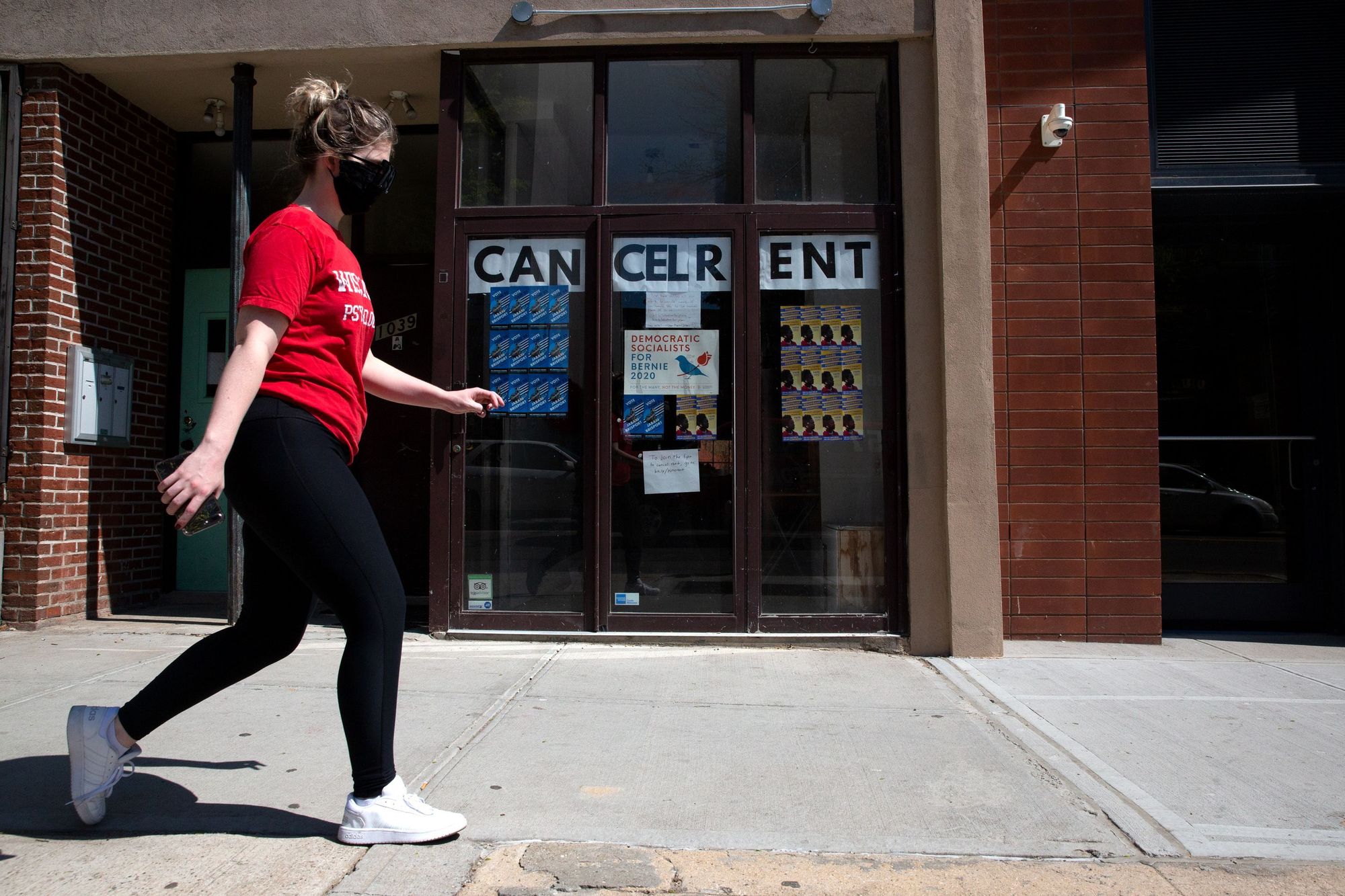Rent Is Due and Relief in the Works — for Those Fortunate Enough to Qualify

By Josefa Velasquez and Ese Olumhense, originally published in THE CITY
With rent due June 1, state lawmakers and courts have taken measures to stave off eviction for tenants who’ve suffered devastating job losses — aid that by design will miss many in greatest need, especially immigrants.
Sonia Perez used to be out of the door of her Bushwick apartment by 6 a.m. and on the job as a street vendor, selling Mexican breakfasts to those heading to work — tamales, champurrado hot chocolate, rice pudding.
The 49-year-old said she typically earned roughly $1,000 a month from her businesses, $1,200 in a good month. It was enough to pay the $900 bill on the rent-stabilized apartment she and her family have lived in for 25 years.
Then the pandemic hit. Under the lockdown, Perez could no longer work as a street vendor.
Her two oldest children, in their 20s, were also left jobless. Her ex-husband, an industrial mechanic, used to send $320 a week in child support for her two youngest children. He died in mid-April, from COVID-19.
“It’s been getting harder,” Perez said in her native Spanish. She hasn’t paid her rent since April and she doesn’t know how much longer she’ll be without a job. Unemployment insurance is out of her grasp, as is a stimulus check because her taxes are “stuck” with a slowed-down IRS.
Perez isn’t alone. Now onto the third month of the state-mandated shutdown of all but “essential” business, thousands of New Yorkers are unable to pay their rent and are not eligible for government assistance, either because of immigration status or, in Perez’s case, for other reasons.
“The working class keeps this city running. We need to cancel rent,” Perez told THE CITY.
“It’s not because we don’t want to pay rent, there’s just no way how. Everything closed down. There are no jobs. If there are no jobs, there is no money,” she said.
An Imperfect Bill
New York City is home to 5.4 million renters in nearly 2.2 million apartments, roughly a quarter of whom did not pay rent in May, according to a landlord trade group.
Housing advocates have pushed to suspend rent obligations for the needy since the pandemic started. But their efforts were quashed when the state Legislature returned to Albany last week to take up a package of COVID-19 bills. The state may supply rent vouchers to tenants earning less than about $82,000 for a family of three.
Instead, state lawmakers begrudgingly approved a measure to use federal relief dollars to provide vouchers to landlords whose tenants have lost income during the pandemic, acknowledging it was a small step toward addressing the larger issue of mounting rent.
“We just felt like this is a way to try to ease some of the rent burden of people who for the last three or four months have seen a loss in income,” Assembly Speaker Carl Heastie (D-Bronx) told THE CITY.
“I mean, is it a perfect bill? No, of course not. But our jobs are to make it better. You come back to the plate and you swing and you try to get a home run the next time,” he added.
To be eligible for the subsidy, which would cover the months of April through July, a tenant must have earned below 80% of the area median income before the pandemic started — about $82,000 for a family of three in New York City.
Applicants must also have already been paying more than 30% of household income toward rent — and then suffered income losses during the shutdowns that increased rent to an even greater share of income.
The state would then pay the difference between 30% of income and the rent due, up to a maximum of about $2,438 for a two-bedroom apartment.
The bill designates the state Division of Homes and Community Renewal to field applications and fine-tune who’s eligible. Among details yet to be determined is whether and how tenants would document income losses — an issue that has tripped up the New York City Housing Authority after it advertised similar rent relief.

State Sen. Brian Kavanagh (D-Manhattan) who chairs the Senate housing committee and sponsored the bill, agreed that the proposal is “inadequate” and “doesn’t meet the need” of renters who have lost substantial income yet would still owe their landlords.
“But as much as it’s inadequate to the full need for those families, for those households, it’s really going to help a lot. It’s going to relieve them of the burden of the rent and the economic and emotional stress that goes with these debts piling up. So, you know, we think it’s a start.”
Gov. Andrew Cuomo’s office hasn’t staked out a position on the proposal, saying the bill is under review.
It’s difficult to estimate how many households would benefit from the assistance given what Kavanagh described as “restrictive criteria.” But with $100 million in vouchers envisioned, if households received $1,000 on average for four months, then 25,000 households in New York would be helped.
The proposal would be funded by dollars designated to New York from the federal Coronavirus Aid, Relief, and Economic Security (CARES) Act, a sliver of the tens of billions of dollars provided.
The city of Los Angeles is contemplating a similar, $100 million subsidy program for its renters. Of the 862,000 renter households in Los Angeles, roughly 74,000 households would benefit from two months worth of subsidies.
‘A Lot of Stress’
The new month means Balthazar Martinez’s rent debt will climb.
The laundromat worker, who was laid off after the lockdown shuttered the business, is undocumented. He owes his Brooklyn landlord two months of rent already and is constantly harassed for payment, he told THE CITY, speaking through an interpreter.
“I am under a lot of stress because my landlord, he is calling me for two months asking for the rent and he is not respecting the moratorium in New York,” Martinez said. “He said to me, ‘In New York you have to pay everything.’ And I asked him if he could wait for two months ‘cause I lost my job and there is no place I can find a job right now.”
Undocumented immigrants were ineligible for federal stimulus money and state unemployment benefits, even though many pay into the state’s unemployment reserve. In the last ten years in New York, the Fiscal Policy Institute said in a May report, undocumented immigrants paid $1.4 billion in unemployment insurance taxes. Gov. Cuomo’s extension until late August of an eviction moratorium requires proof of tenant hardship.
Now the shifting sands of Cuomo’s eviction moratorium leave Martinez on more unsteady ground.
An initial executive order from the governor limits evictions for most New Yorkers through June 20. Cuomo extended relief with a second order that goes through late August — but only to a hard-hit subset of tenants, murkily defined.
The new order limits initiation of eviction proceedings and enforcement to those who are “eligible for unemployment insurance or benefits under state or federal law or otherwise facing financial hardship due to the COVID-19 pandemic.”
Housing court administrators have advised landlords looking to evict to first file an affidavit confirming the tenants’ hardship.
The need to lay out the case that an immigrant is ineligible for unemployment insurance and other aid has some advocates worried about exposing the status of undocumented tenants to landlords and the courts.
‘Out in the Cold’
Anu Joshi, vice president of policy at the New York Immigration Coalition, said the new directive is “just one more example of how the undocumented immigrant community and their families are being left out in the cold.”
One undocumented woman in East Harlem, who cleaned homes before the pandemic, says she wakes up each day worried that her family will lose their home.
She is now a month behind on rent — her father died of cancer in March, she said, a tragedy that exhausted their savings. The start of another month has increased her anxiety.
Her husband, who at one point was sick with the virus, is also currently unemployed.
“No one could have expected this,” the mom of three said in Spanish, through an interpreter. “Please help us.”
“It’s not that we don’t want to work,” she added. “We also don’t want to risk our lives. No one else has thrown us a lifeline.”
Martinez said his landlord has already begun threatening him over his immigration status.
The landlord vowed to raise the rent on June 1, even though the lease does not expire until October, Martinez said. The landlord also said he’ll call law enforcement “so the police can come and pick me up,” said Martinez, the father of a young son.
Spike in Court Cases
State Office of Court Administration officials say they expect an “influx of new eviction cases” in city housing courts that are grappling with how to reopen cramped and crowded spaces safely.
In remarks in late May, Chief Judge Janet DiFiore said judges had started conducting “virtual conferences” in pending eviction cases, where both sides are represented by lawyers.
Reopened courthouses are “limiting public density,” she added, by leaning on “virtual technology to conduct as much court business as possible,” while putting measures in place that range from personal protective equipment to plexiglass barriers.
Attorneys for tenants told THE CITY they’re concerned about the risks to clients compelled to appear to prevent eviction.
“The courts are very concerned about the backlog, and how they’re going to handle these cases,” said Justin La Mort, a supervising attorney at Mobilization for Justice.
“And I will say tenant advocates are fearful that the push for efficiency may come at the cost of due process or justice.”
THE CITY is an independent, nonprofit news outlet dedicated to hard-hitting reporting that serves the people of New York.



